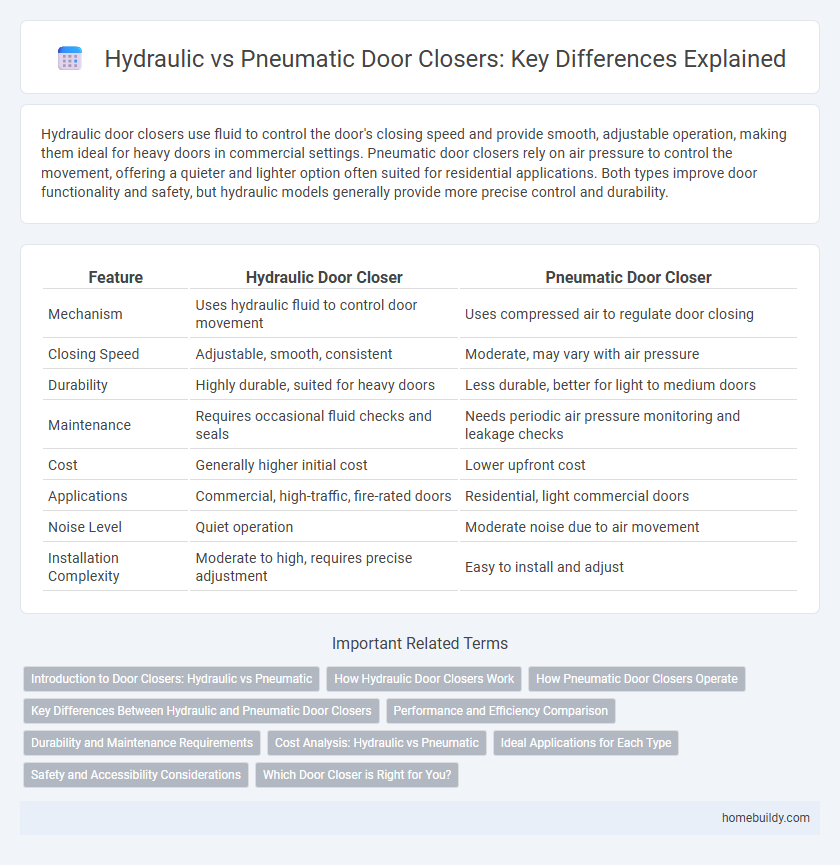Hydraulic door closers use fluid to control the door's closing speed and provide smooth, adjustable operation, making them ideal for heavy doors in commercial settings. Pneumatic door closers rely on air pressure to control the movement, offering a quieter and lighter option often suited for residential applications. Both types improve door functionality and safety, but hydraulic models generally provide more precise control and durability.
Table of Comparison
| Feature | Hydraulic Door Closer | Pneumatic Door Closer |
|---|---|---|
| Mechanism | Uses hydraulic fluid to control door movement | Uses compressed air to regulate door closing |
| Closing Speed | Adjustable, smooth, consistent | Moderate, may vary with air pressure |
| Durability | Highly durable, suited for heavy doors | Less durable, better for light to medium doors |
| Maintenance | Requires occasional fluid checks and seals | Needs periodic air pressure monitoring and leakage checks |
| Cost | Generally higher initial cost | Lower upfront cost |
| Applications | Commercial, high-traffic, fire-rated doors | Residential, light commercial doors |
| Noise Level | Quiet operation | Moderate noise due to air movement |
| Installation Complexity | Moderate to high, requires precise adjustment | Easy to install and adjust |
Introduction to Door Closers: Hydraulic vs Pneumatic
Hydraulic door closers use fluid pressure to control door movement, offering smooth and adjustable closing speeds, ideal for high-traffic commercial settings. Pneumatic door closers rely on air pressure to regulate door motion, providing quieter operation and simpler mechanisms suited for lightweight interior doors. Understanding the differences in force control and installation requirements is essential for selecting the appropriate door closer for specific building needs.
How Hydraulic Door Closers Work
Hydraulic door closers operate through a fluid-filled chamber where the door's movement forces hydraulic fluid through a series of valves, controlling the speed and smoothness of the door's closing action. The adjustment of these valves allows precise regulation of the closing and latching speeds, ensuring consistent performance regardless of door weight or external conditions. This mechanism provides durability and reliable resistance to sudden door slams, making hydraulic door closers ideal for heavy doors or high-traffic areas.
How Pneumatic Door Closers Operate
Pneumatic door closers operate using air pressure to control the door's closing speed and force, relying on a cylinder filled with compressed air that gradually releases as the door closes. This mechanism ensures smooth, quiet operation with adjustable closing resistance, making pneumatic closers ideal for environments requiring gentle door handling. Compared to hydraulic door closers, pneumatic models offer simpler maintenance and better performance in extreme temperatures without the risk of fluid leaks.
Key Differences Between Hydraulic and Pneumatic Door Closers
Hydraulic door closers use fluid to control the door's motion, offering smooth, adjustable closing speed and strong resistance for heavier doors. Pneumatic door closers rely on air pressure to regulate closing, providing quieter operation and suitability for lighter interior doors but less precise control. Key differences include hydraulic systems' durability and adaptability to various door weights versus pneumatic closers' simpler mechanism and cost-effectiveness for low-traffic areas.
Performance and Efficiency Comparison
Hydraulic door closers provide precise control over door speed and offer consistent closing regardless of temperature changes, ensuring smooth and reliable operation in high-traffic environments. Pneumatic door closers rely on air pressure, which can fluctuate, leading to variable closing speeds and less consistent performance under extreme temperature variations. Hydraulic systems typically deliver greater energy efficiency by reducing the force needed to operate the door, minimizing wear and maintenance compared to pneumatic alternatives.
Durability and Maintenance Requirements
Hydraulic door closers typically offer greater durability due to their metal construction and fluid-based mechanism, which provides smooth and consistent closing over time. Pneumatic door closers rely on air pressure, making them more prone to leaks and requiring more frequent maintenance to ensure optimal performance. Maintenance for hydraulic door closers usually involves periodic oil checks and adjustments, whereas pneumatic models need regular inspection for air leaks and pressure regulation.
Cost Analysis: Hydraulic vs Pneumatic
Hydraulic door closers generally have a higher upfront cost due to their complex internal mechanisms and superior durability, making them a suitable long-term investment for high-traffic areas. Pneumatic door closers are typically more affordable initially, offering cost savings in small-scale or low-usage applications but may incur higher maintenance expenses over time due to wear and tear on air-seal components. Evaluating total cost of ownership, including installation, maintenance, and lifespan, often positions hydraulic door closers as more cost-effective in commercial or heavy-use environments compared to pneumatic alternatives.
Ideal Applications for Each Type
Hydraulic door closers are ideal for commercial buildings requiring controlled, smooth door operation and durability in high-traffic areas. Pneumatic door closers are best suited for lighter traffic environments such as residential or small office spaces where quieter, softer closures are preferred. Selecting the right door closer depends on factors like door weight, frequency of use, and environmental conditions.
Safety and Accessibility Considerations
Hydraulic door closers provide controlled, smooth closing motion that enhances safety by reducing the risk of door slamming and injury, making them ideal for high-traffic and accessibility-sensitive areas. Pneumatic door closers rely on air pressure, offering adjustable closing speed but less consistent control, which may pose challenges for users with mobility issues or those requiring slow door operation. Prioritizing hydraulic closers ensures compliance with accessibility standards like ADA by providing reliable, manageable door operation for all users.
Which Door Closer is Right for You?
Hydraulic door closers provide precise control and smooth closing by using fluid pressure, making them ideal for heavy doors and high-traffic areas. Pneumatic door closers rely on air pressure and are generally more cost-effective, suited for lighter doors with moderate use. Choosing the right door closer depends on door weight, usage frequency, and desired control level for optimal performance and safety.
hydraulic door closer vs pneumatic door closer Infographic

 homebuildy.com
homebuildy.com